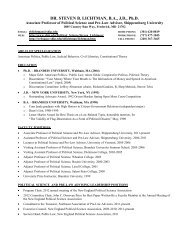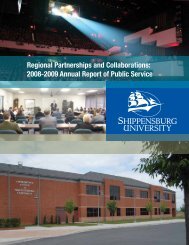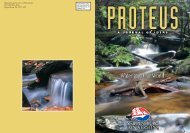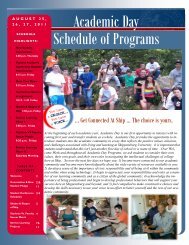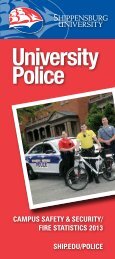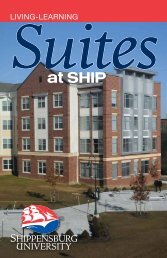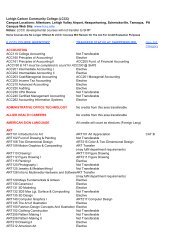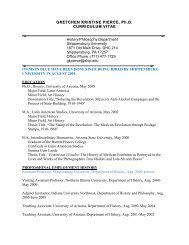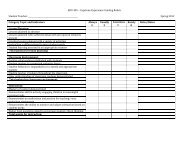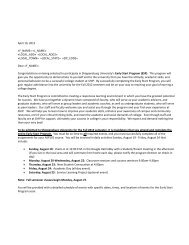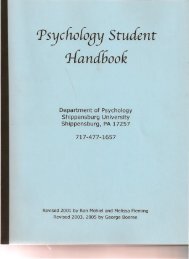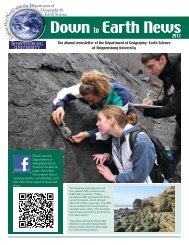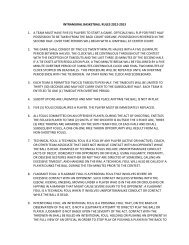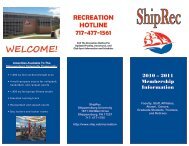Graduate Catalog - Shippensburg University
Graduate Catalog - Shippensburg University
Graduate Catalog - Shippensburg University
Create successful ePaper yourself
Turn your PDF publications into a flip-book with our unique Google optimized e-Paper software.
Courses of InstructionMAT450 Combinatorics (3 crs.)Concerned with computing within discrete mathematical structuresand combinatorial problem solving. Topics include enumerationtechniques including recurrence relations and generating functions;and may include graph theory and graph algorithms. Prerequisite:MAT320 or permission of the instructor.MAT456 Deterministic Methods of Operations Research (3 crs.)After a brief historical introduction, presents a detailed study ofmathematics related to linear programming. The theory includes thesimplex method, duality theory, sensitivity analysis, and matrix games.Some applications will be given. Prerequisites: MAT212 and MAT318.MAT476 Probability (3 crs.)In-depth development of probability and distribution theory. Topicsinclude counting techniques, Bayes’ Theorem, random variables,moment-generating functions, univariate and multivariate probabilitydistributions, and the Central Limit Theorem. Prerequisites: MAT213and MAT318.MAT486 Mathematical Statistics (3 crs.)Continuation of MAT476. Topics include transformations of randomvariables, order statistics, convergence in distribution, point and intervalestimation, likelihood ratio tests, hypothesis testing, linear models,analysis of enumerative data, and analysis of variance. Prerequisite:MAT476.MAT490 Selected Topics in Mathematics (3 crs.)Opportunity to offer experimental courses at the senior level inareas of mathematics not covered by regular courses. Topics such asfoundations of mathematics, number theory, graph theory, cryptography,and advanced applications of mathematics are appropriate at thislevel.MAT516 Mathematical Modeling (3 crs.)Involves the process of developing mathematical models as a meansfor solving real problems. Encompasses several different modelingsituations that use a variety of mathematical topics. The mathematicalfundamentals of these topics will be discussed, but with continuedreference to their use in finding the solutions to problems. Connectionsto NCTM Standards, current curriculum projects and the use ofvarious technologies will be made throughout the course.MAT527 Number Theory Discovery (3 crs.)Number theory, one of the oldest branches of mathematics, is verymuch an alive subject, with discoveries made every day. Focus is ontopics that relate specifically to the natural numbers. These will betreated as motivational problems to be used in an activity-orientedapproach to teaching mathematics at the middle and high school levels.Pace will be non-frantic and designed to promote understandingof the topics covered. Topics include prime number facts and conjectures,divisibility theory for integers, magic squares, Pascal’s triangle,Fibonacci numbers, modular arithmetic, and mathematical art.MAT528 Algebra for Teachers of Mathematics (3 crs.)Classically algebra has its origins in the solution of equations. Theterm algebra comes from the Arabic word meaning reductions orrestoration and had to do with the idea that in equations whateverwas done to one side had to be done to the other in order to maintainor restore equivalence. Modern algebra developed from severalclassical problems such as: efforts to systematically understand thesolutions of polynomials of higher degree; problems of geometry suchas construction of regular polygons, trisection of angles, etc., andproblems in number theory, e.g. Fermat’s Last Theorem. Studies theintegers, rationals, reals, polynomials and complex numbers from thepoint of view of being examples of some of the fundamental objectsof algebra—rings and fields.MAT534 Geometrical Concepts (3 crs.)Focuses primarily on the foundations and applications of Euclideanand non-Euclidean geometries. Incorporates collaborative learningand the investigation of ideas through group projects and the use oftechnology. Topics include finite geometries, geometric transformations,triangle and circle properties not previously encountered, andspherical geometry. Provides deeper understanding of geometry thatis needed to teach geometry and to illustrate connections between itand other branches of mathematics.MAT538 Topics in Discrete Mathematics (3 crs.)Discrete mathematics is the primary source of examples for the ProblemSolving and Reasoning and Proof Standards in the 2000 NCTMPrinciples and Standards for School Mathematics. Provides an in-depthlook at one or more of the many branches of discrete mathematics,with particular emphasis on Problem Solving and Reasoning andProof in the Secondary Math Curriculum. Specific topics will betaken from the fields of graph theory, recurrence relations, generatingfunctions, game theory, design theory, coding theory, combinatoricsor cryptography. Prerequisite: MAT320 or familiarity with mathematicalproof.MAT543 Concepts of Calculus (3 crs.)Many high schools teach some form of calculus. Current reform effortshave shifted the emphasis toward conceptual understanding ofkey ideas. Conceptual questions take many forms, including interpretinggraphical data, using numerical estimation, proving propertiesof functions and operations, and understanding the foundations ofthe basic calculus tools. Uses a standard textbook for single variablecalculus along with material correlated with the AP Calculus exam,and will emphasize the theory behind the main ideas to prepareteachers for creation, discussion, and assessment of conceptual calculusproblems.MAT551 Technology in the Teaching and Learning of Mathematics(3 crs.)Provides opportunities to explore the utilization of desktop andhandheld technologies, which enhance the teaching and learning ofmathematics. Applications of calculators to the school curriculumto be explored include the use of graphing, symbolic, and scientificcalculators as well as peripherals such as CBLs and CBRs. Opportunitiesto investigate computer supported symbolic manipulationsystems, geometry programs, spreadsheet applications, and Internetresources. Prerequisite: graduate standing or permission of instructor.MAT552 Mathematical Discovery (3 crs.)Treats problems from many areas of mathewith emphasis on understanding,learning, and teaching problem solving. The history ofproblem solving in general and its application to particular problemsis investigated.MAT572 Probability for Middle and High School Teachers (3 crs.)Explores introductory topics such as computing probabilities forsimple, compound events, mutually exclusive and conditional events.Further topics include the study of random variables, expected value,discrete distributions including binomial and Poisson, continuousdistributions including normal, uniform, and exponential, simulations,and sampling distributions of sample statistics. TI-83 graphingcalculators and the statistical package Fathom used throughout thecourse.MAT573 Statistics for Middle and High School Teachers (3 crs.)Involves the study of statistical methods. Both graphical and numericalrepresentations of data, including histograms, box plots, scatterplots,and measures of center and spread will be introduced. Processof data collection and experimental design will be explored. Concludeswith topics involving inference, including confidence intervalsand hypothesis tests for means and proportions. Real data sets froma variety of disciplines will be utilized. The TI-83 graphing calculatorand the statistical package Fathom used throughout the course.Prerequisite: MAT572.99



